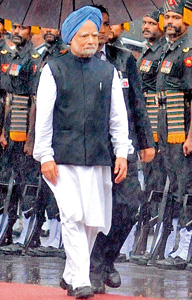NEW DELHI, Aug 20 (AFP) - There is no small irony in the fact that India's Prime Minister Manmohan Singh, known for his probity and integrity, now finds himself fighting for political survival with an anti-corruption activist.
When the Congress party won elections in 2004, its decision to name Singh as premier was partly based on his unblemished record as the “Mr Clean” of Indian politics.
After a thumping re-election in 2009, Singh was more popular than ever and there was never any doubt that he would retain the post for another term.
 |
| Singh inspects a guard of honour of Indian troops in New Delhi on India’s Independence Day, August 15. AFP |
But in the past year his reputation has taken a battering with a succession of high-profile, multi-billion-dollar corruption scams involving some top government officials.
More recently he has been locked in a damaging battle of wills with the hugely popular campaigner Anna Hazare, who has triggered a wave of public fury over corruption that has left Singh, 78, struggling to respond.
His administration has made some crucial blunders in handling the Hazare phenomenon, including arresting the 74-year-old in a bid to prevent a planned hunger strike aimed at forcing the government to draft stronger anti-graft laws.
“The PM's credibility was severely damaged by the decision to arrest, then release Hazare. He totally misread the public mood,” said Zoya Hassan, a professor of political science at Delhi's Jawaharlal Nehru University.
Tens of thousands of Indians took to the streets of cities across India to protest at Hazare's detention, forcing the government to back down, order his release and grant him the right to stage a 15-day public fast.
Singh then took his argument against Hazare to parliament, but his remarks that the activist's tactics were “totally misconceived” only served to stoke public anger and the widespread belief that the PM was out of touch.
The prime minister has repeatedly said his government is serious about fighting corruption, but analysts say he has done little to make good on his promises.
An editorial in the Hindustan Times newspaper warned Singh that “no one is willing to listen anymore... The clock is ticking and we can only hope it is not a doomsday one.”One of Singh's former ministers is on trial and another has resigned over a the tainted sale of telecom licences in 2008, which cost the exchequer up to $40 billion in lost revenues, according to the national auditor.
No-one has accused the prime minister of any personal impropriety, but he has been tainted by association and criticised for turning a blind eye to the actions of other members of his government who do not share his reputation for moral rectitude.
Parsa Venkateshwar Rao, a political analyst and columnist for the DNA newspaper said Singh “simply doesn't take corruption seriously enough”.
“He believes that the government has more important priorities to address like economic reforms and welfare programmes,” Rao told AFP.
An economist who studied at both Cambridge and Oxford, Singh served as India's finance minister in the 1990s and launched the financial and economic reforms that led to the country's emergence as the world's second-fastest-growing major economy.
Now, with inflation running dangerously high, discontent over corruption has shot up among India's growing urban middle class who have called for Singh to shed his quiet, soft-spoken ways and tackle graft aggressively.
“He has always maintained a low-key presence, which today makes him seem ineffective before a public which needs him to speak loudly in a time of confusion and crisis. He doesn't inspire their confidence,” said Rao.
A few months ago, Indian Home Minister P. Chidambaram acknowledged in an interview that the public wanted to hear more often from Singh.
“Lots of people would like the prime minister to step up to the plate, so as to say, and speak more often. But that is the style of the person,” Chidambaram told the NDTV channel.
In a sign of growing concern over Singh's ability to lead, a poll released earlier this month by a New Delhi-based research institute showed that Indians' top choice for prime minister was Rahul Gandhi, scion of the Nehru-Gandhi political dynasty.
Some 34 percent of the more than 20,000 people polled said Gandhi, 43, should replace Singh immediately as premier, compared to just 22 percent who wanted Singh to stay on.
The face-off with Hazare will have done nothing to reverse those numbers, but experts say the government is unlikely to want a leadership change before 2014, when national elections are slated to take place.
“The Congress would not want to expose Rahul Gandhi to criticism at a point when the government has its back to the wall. Even though Singh is losing ground, he will stay on,” Rao said.
|


